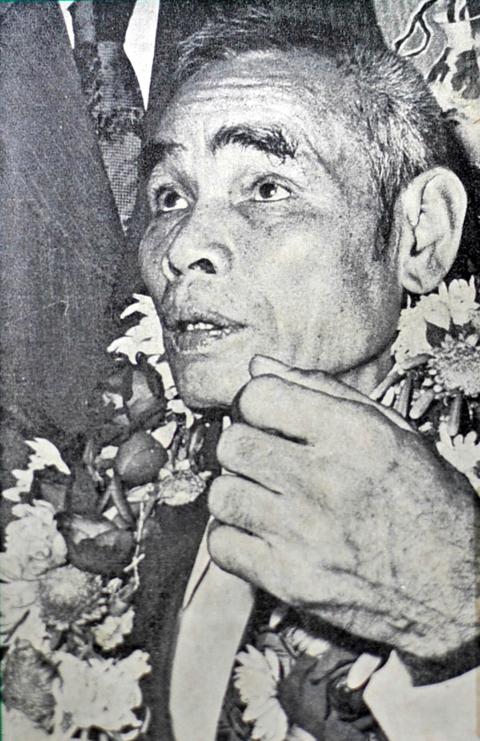Taiwan in Time: Jan. 4 to Jan. 10
On Jan. 8, 1975, nearly 30 years after the end of World War II, former Imperial Japanese Army soldier Nakamura Teruo finally returned home.
It was a different place from what he had known. His native land was no longer part of Japan. His son, who was an infant when he left, was now a father of four children, and his wife had remarried. Everyone was calling him Lee Kuang-hui (李光輝) — a name he had never even heard of when he departed for Indonesia with the Takasago Volunteer Unit in 1944.

Photo: Wikimedia Commons
A member of the Amis people, Western reports have his Aboriginal name as Attun Palalin, while local sources call him Suniuo, which is what this article will go with.
Even though the Takasago were a volunteer army in name, Suniuo says he was forced to enlist. Shortly after he landed on Morotai Island in Indonesia, the Allies arrived and secured it as a base. Suniuo lost contact with his group during this time.
Armed with an assault rifle, a helmet, knife, cooking pot and a mirror, Suniuo built a hut and remained in the jungle alone, surviving by hunting and farming. He did not know that the war had already ended, as the Japanese army declared him dead on Nov. 13, 1944.

Photo: Wikimedia Commons
Unsure of the situation outside of the jungle, Suniuo stayed hidden at all costs, cooking only in the dark so people wouldn’t see the smoke. In a first-hand account published shortly after his return titled Struggle in the Jungle for 30 Years (叢林掙扎三 十年), Suniuo recalls counting the days by the moon and recording each cycle by tying a knot in a rope. He says his upbringing in the mountains in relative poverty provided him the will and ability to survive for so long.
“I calmly stayed alive there,” he says. “Although I didn’t have anybody to talk to, buried deep in my heart seemed to be a glimmer of hope and expectation. The only trace of happiness during this time came from the fact that I was still alive and I hadn’t lost my sense of existence yet.”
As Suniuo’s only clothes deteriorated over time, he says he became used to being naked most of the time, only using a US Army jacket he found to cover himself at night.
Most of his time was devoted to finding food, he says. He grew sweet potatoes, beans, bananas and sugar cane in his garden, gathered roots and fruits and trapped boar, pheasant and other birds.
“Not to lose my life became my only goal, and that exhausted almost all of my time,” he says.
The only two forms of entertainment he had was fishing and fiddling with a home-made abacus. In order to keep himself from thinking of his family at home, he stayed busy exploring his surroundings and undertaking various improvement projects around his hut.
Suniuo says he made a grave error in assuming that war wasn’t over from the planes that flew by above him each day, only later to find out that it was because the jungle was near an Indonesian air force base. As aviation technology improved over time, planes became faster and sleeker, and Suniuo thought it was the result of an arms race between the two warring sides.
“I made one simple wrong judgment, and it cost me 30 years,” he says.
In November 1974, local reports surfaced of a “naked wild man” in the mountains, prompting the Indonesian army to send an expedition force, which, after 30 hours, found Suniuo chopping wood outside his hut.
This brought up the question of whether he should be repatriated to Japan or Taiwan. Suniuo was given the choice, and he chose his homeland.
According to this biography, his back pay as a soldier over 30 years only amounted to about NT$7,000. But after some commotion in the media, the Japanese government decided to give him over NT$380,000 instead. He later received various donations from Japanese, Indonesian and local sources.
Yet, a return after so long has to be bittersweet. His parents were dead, and only two siblings survived — all going by Chinese names now. Suniuo’s wife’s new husband (of more than 10 years) was originally willing to move out and let the couple reunite, but Suniuo decided not to disturb their life and bought an apartment nearby. Just four years after his return, he died of lung cancer.
Taiwan in Time, a column about Taiwan’s history that is published every Sunday, spotlights important or interesting events around the nation that have anniversaries this week.

April 14 to April 20 In March 1947, Sising Katadrepan urged the government to drop the “high mountain people” (高山族) designation for Indigenous Taiwanese and refer to them as “Taiwan people” (台灣族). He considered the term derogatory, arguing that it made them sound like animals. The Taiwan Provincial Government agreed to stop using the term, stating that Indigenous Taiwanese suffered all sorts of discrimination and oppression under the Japanese and were forced to live in the mountains as outsiders to society. Now, under the new regime, they would be seen as equals, thus they should be henceforth

Last week, the the National Immigration Agency (NIA) told the legislature that more than 10,000 naturalized Taiwanese citizens from the People’s Republic of China (PRC) risked having their citizenship revoked if they failed to provide proof that they had renounced their Chinese household registration within the next three months. Renunciation is required under the Act Governing Relations Between the People of the Taiwan Area and the Mainland Area (臺灣地區與大陸地區人民關係條例), as amended in 2004, though it was only a legal requirement after 2000. Prior to that, it had been only an administrative requirement since the Nationality Act (國籍法) was established in

With over 80 works on display, this is Louise Bourgeois’ first solo show in Taiwan. Visitors are invited to traverse her world of love and hate, vengeance and acceptance, trauma and reconciliation. Dominating the entrance, the nine-foot-tall Crouching Spider (2003) greets visitors. The creature looms behind the glass facade, symbolic protector and gatekeeper to the intimate journey ahead. Bourgeois, best known for her giant spider sculptures, is one of the most influential artist of the twentieth century. Blending vulnerability and defiance through themes of sexuality, trauma and identity, her work reshaped the landscape of contemporary art with fearless honesty. “People are influenced by

The remains of this Japanese-era trail designed to protect the camphor industry make for a scenic day-hike, a fascinating overnight hike or a challenging multi-day adventure Maolin District (茂林) in Kaohsiung is well known for beautiful roadside scenery, waterfalls, the annual butterfly migration and indigenous culture. A lesser known but worthwhile destination here lies along the very top of the valley: the Liugui Security Path (六龜警備道). This relic of the Japanese era once isolated the Maolin valley from the outside world but now serves to draw tourists in. The path originally ran for about 50km, but not all of this trail is still easily walkable. The nicest section for a simple day hike is the heavily trafficked southern section above Maolin and Wanshan (萬山) villages. Remains of